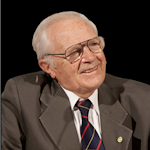Professor Luigi Pasinetti was admitted as a research student at the Faculty of Economics in 1956 and returned in 1989 as a Visiting Professor.
Born on September 12, 1930, in Zanica, near Bergamo in northern Italy, he began his economics studies at Milan’s Università Cattolica, where he obtained his “laurea” degree in 1954.
He won several scholarships for postgraduate studies at the University of Cambridge (1956 and 1958), Harvard University, United States (1957) and the University of Oxford (1959).
An Italian economist of the post-Keynesian school. Professor Pasinetti has been described as the heir of the Cambridge Keynesians and a student of Piero Sraffa and Richard Kahn. Along with them, as well as Joan Robinson, he was one of the prominent members on the ‘Cambridge, UK’ side of the Cambridge capital controversy, neatly explained by Professor Geoff Harcourt.
His research was an inquiry into the dynamic theory of economic growth and income distribution, with his work rooted in classical economic analysis.
Professor Leonardo Felli is Chair of the Faculty and Professor of Economics at the Faculty of Economics. “Professor Luigi Pasinetti is fondly remembered at Cambridge where he spent the first part of his career as a research student of Joan Robinson and Nicholas Kaldor and went on to become a renowned economist within the Faculty before leaving Cambridge to go back to Milan,” he said. “His key contributions to the Cambridge UK side of the Cambridge capital controversy are well known as it is the Pasinetti Theorem.”
His 1962 paper, the now famous Pasinetti Theorem (Pasinetti, 1962), achieved the result of re-stating Kaldor's original equations without the need to rely on the assumptions that the workers propensity to save was zero, which was no longer regarded as contemporary. When Pasinetti presented his views about these issues to an audience, he himself described the moment:
“I dared, while being the youngest member, to present the results of my work on income distribution to a session of the so-called ‘Secret Seminar’ in King's College (a post-war version of Keynes's more famous Circus) - a unique experience for me. I presented my results as a criticism of Kaldor's theory. The members of the audience were stunned, or suspicious, or disbelieving, with one exception: Nicky Kaldor. He was extraordinarily quick in grasping the gist of the idea and in seeing that the concession of his having fallen into a ‘logical slip’ led to a generalization of the post-Keynesian (in fact of Kaldor's) theory of income distribution and moreover to a new, long-run, Keynesian theory of the rate of profits.”
The young Italian student became in time one of the foremost Cambridge economists of his generation.
In 1960 Oxford's Nuffield College granted him a Research Fellowship that he enjoyed until 1962, the year in which he left for the University for Cambridge, called there by the prestigious economist Lord Richard Kahn. He became a Fellow of King’s College, Cambridge, and he was awarded his PhD in 1963. In 1973, he was appointed Reader at the University, a post that he kept until his return to the Università Cattolica Milano in 1976, where he was elected dean of the faculty of economics.
Professor Luigi Pasinetti was elected an Honorary Fellow of Caius College in 1999.
“I did meet him many times when he visited Cambridge but this was well after he left Cambridge,” adds Professor Hamid Sabourian, a Professor of Economics and Game Theory at the Faculty of Economics and a Fellow of King's College. “He was around in the 60s and early 70s in the faculty and of course he maintained a close connection with King’s College. His work related to developing the analytical foundations of neo-Ricardian economics, including the theory of value and distribution, as well as work in the line of Kaldorian theory of growth and income distribution. time that were critical of the orthodoxy.”
Professor Pasinetti received a long list of distinctions and honours for his academic work, and provided valuable contributions to several major economic journals. He was a founding Patron of the Cambridge Journal of Economics (since 1977) and had roles with the Journal of Post Keynesian Economics (since its founding in 1978) and Kyklos (1981).
He was latterly Emeritus Professor at the Università Cattolica Milano.






